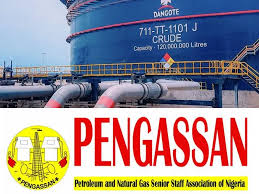The nationwide strike declared by the Petroleum and Natural Gas Senior Staff Association of Nigeria (PENGASSAN) on Monday paralysed operations at critical oil and gas institutions, raising fears of fuel scarcity and disruptions in power supply.
The industrial action, which took effect at midnight on September 29, followed a directive from the union’s National Executive Council over the alleged wrongful dismissal of about 800 workers at the Dangote Petroleum Refinery.
Our correspondent observed that the strike brought activities at the Nigerian National Petroleum Company Limited (NNPCL), the Nigerian Upstream Petroleum Regulatory Commission (NUPRC), and the Nigerian Midstream and Downstream Petroleum Regulatory Authority (NMDPRA) to a halt.
At the NUPRC headquarters in Abuja, the main gate remained locked, with stranded staff milling outside the premises. Security operatives on duty confirmed that no employee was allowed entry in line with the strike order. In the nearby Central Business District, activities at the NMDPRA headquarters were also completely shut down, with staff complying fully.
Confirming the level of adherence, PENGASSAN Chairman at the NMDPRA, Mr. Tony Iziogba, told our correspondent that the action recorded “100 per cent compliance,” barring both staff and visitors from accessing offices. He said the same level of compliance had been achieved across other agencies, including NNPCL.
The strike directive has already sent shockwaves through the energy industry. Oil marketers have warned that halting gas and crude supply to the Dangote Refinery could trigger severe disruptions in the downstream market. With NNPCL still the sole importer of petrol and NMDPRA responsible for supply and distribution regulation, the development risks choking the domestic market and pushing up pump prices.
In its statement, the union said the strike became inevitable after management at the Dangote Refinery allegedly violated Nigerian labour laws and International Labour Organisation conventions. PENGASSAN accused the company of sacking workers for joining the union and replacing them with foreigners.
“All processes involving gas and crude supply to Dangote Refinery should be halted immediately,” the union declared in a resolution signed by its General Secretary, Mr. Lumumba Okugbawa. “All IOC branches must ramp down gas production and supply to Dangote Refinery and petrochemicals.”
The resolution also directed members in all field locations to down tools as of 6:00 am on Sunday, September 28, while commencing a round-the-clock prayer vigil ahead of the nationwide action. By early Monday morning, members across the country had withdrawn their services, crippling operations in vital institutions.
The strike coincides with a delicate moment for the Nigerian energy sector. NUPRC plays a key role in monitoring crude production and enforcing gas supply obligations to power plants. NMDPRA regulates midstream and downstream activities, while NNPCL is central to fuel imports and distribution. With all three agencies grounded, the ripple effects could extend beyond fuel queues to possible electricity blackouts.
Labour leaders insist the action will continue until the sacked refinery workers are reinstated. They further demanded an apology from the management of Dangote Refinery and called on the Federal Government to intervene.
Meanwhile, the Minister of Labour has convened an emergency meeting with union leaders and company representatives to seek a resolution. Industry stakeholders are watching closely to see whether dialogue will restore calm or deepen the crisis.
If unresolved, analysts warn the strike could drag Nigeria into another round of nationwide scarcity, at a time when global oil prices remain volatile and inflation continues to squeeze households.
As the standoff persists, the spotlight remains on both sides—PENGASSAN, which insists it is defending workers’ rights, and Dangote Refinery, which is yet to issue an official response to the allegations. The outcome of the Labour Ministry’s intervention may determine how long Nigerians will endure another round of fuel supply uncertainty.
